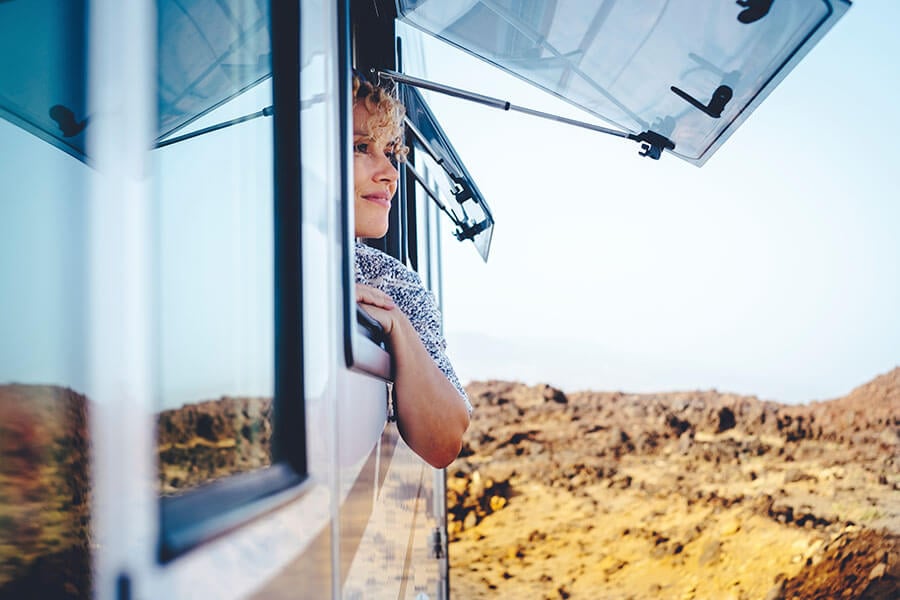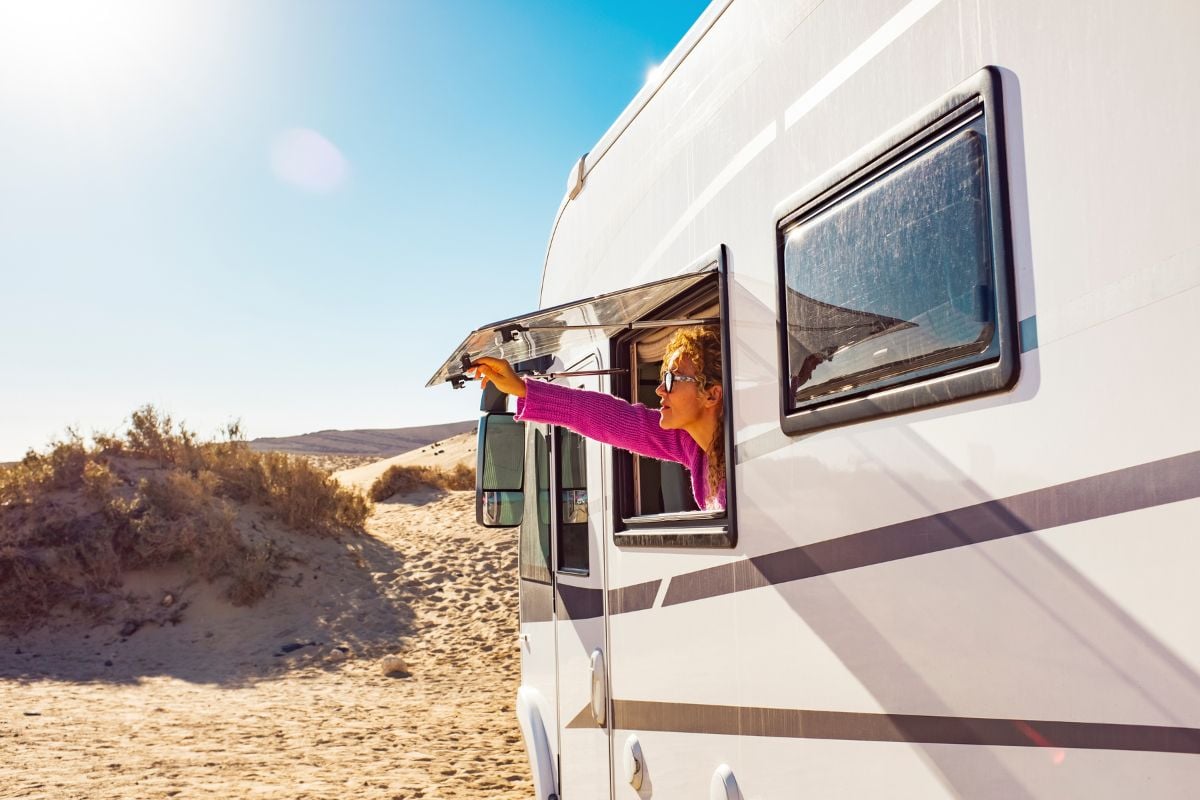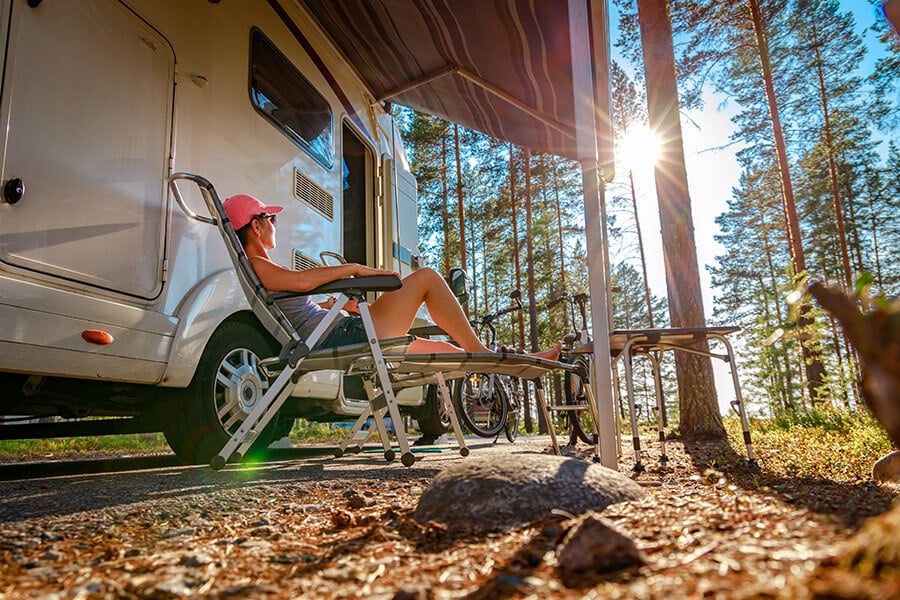RVs are a great way to travel. These homes on wheels allow you to cruise to your destination in comfort and luxury. When you arrive, there’s no need to rent a hotel room since you brought your own accommodations.
If you are thinking about buying an RV, you may be wondering how the financing works. While zero-down RV financing is possible, there are some important things to know before applying to make sure you have the best chance of loan approval.
How Do RV Loans Work?
RVs can be either simple and small or large and elaborate. Because they vary so much in size and amenities, prices can vary a lot. You might find a small used RV, for example, for $25,000, while the most expensive models may go for over $1 million when purchased new.
Because RVs are often more expensive than cars, special RV loans are used to finance them. These loans have fixed interest rates, and they are repaid with fixed monthly payments. The repayment term may be up to 15 years.
Where Can You Get an RV Loan?
Dealers often arrange RV financing for buyers, just as it’s done when purchasing cars. Although this is convenient, you will most likely pay more in interest if you go with dealer financing. This is because dealers often add a margin to the interest rate that lenders charge to increase their profits.
RV loans are also offered by banks and credit unions. Credit unions usually offer the best interest rates because of how they are structured. Unlike banks, which are for-profit organizations, credit unions are nonprofit.
With credit unions, the members are the owners. Instead of focusing on making a profit for their shareholders, credit unions focus on providing the best service and the lowest rates and fees to their members.
The interest rate for an RV loan is important when considering your financing options. Because an RV may cost as much as a traditional home, a 1-2 point difference in your loan’s rate could result in you paying tens of thousands more over the life of the loan.
How to Buy an RV Without a Down Payment
While it is possible to finance the full purchase price of an RV, you’ll have to meet stringent borrowing requirements to do so. Each lender will have its own criteria, and you’ll need a strong credit score. If your credit score isn’t stellar, you will most likely be required to have a down payment.
It’s also important not to have too much debt when you apply. The more debt you have, the greater the possibility that you’ll either miss payments or default on the loan.
To obtain zero-down RV financing, you’ll need to secure the loan with collateral. Good news—RV loans often use the RV itself as collateral. Other collateral could be real estate, an investment account, or home equity.
If the RV you’re buying is used as collateral, it’s important to keep in mind that if you default on the loan, you’ll most likely lose the RV. It will be repossessed and then sold to recover the borrowed money.
You can know for sure whether a down payment will be required to buy an RV by applying for pre-approval. Pre-approval means that your financial information has been reviewed and that you are conditionally approved to borrow a certain amount. Pre-approval is not the same as loan approval, although it usually does start the loan application process.
Improving Your Chances of Obtaining a Zero-Down RV Loan
If your goal is to obtain a zero-down RV loan, it’s important to make sure you have a great credit score and a low debt-to-income ratio before applying. There are some steps you can take to improve these and increase your chances of loan approval.
Improving Your Credit Score
One thing you can do to improve your credit score is to make sure you aren’t using too much of your available credit. This is known as the credit utilization ratio, and it’s an important part of your credit score. Ideally, you don’t want to use more than 30% of your available credit at a time. Paying off some or all of your credit card debt can help to decrease this ratio.
Another important thing you can do to help your credit score is not to apply for new credit accounts for a while before applying for an RV loan. Each time you apply for a new credit account, a hard credit check will be done. Hard credit checks decrease your credit score a small amount for up to a year.
Improving Your DTI Ratio
Maintaining a good debt-to-income (DTI) ratio is also important in obtaining an RV loan without a down payment. This ratio is a simple comparison of how much debt you currently have to your monthly income. Calculating your DTI ratio is very easy and can be done in three simple steps.
- Add up your monthly debts.
- Add up your monthly gross income.
- Divide your monthly debts by your monthly gross income.
A good DTI ratio is 43% or less. If you discover that your DTI ratio is over this amount, you may be able to lower it by paying off some of your current debts. The lower your DTI ratio, the greater your chances of obtaining a zero down payment RV loan.
RV Loans With Wasatch Peaks Credit Union
If you’re looking forward to an adventure-filled road trip in an RV, Wasatch Peaks Credit Union offers RV loans with no application fees and repayment terms of up to 15 years. Interest rates are fixed and are among the lowest in Utah.
You can also obtain loan pre-approval before you start shopping for the perfect RV. This allows you to know exactly how much RV you can afford and whether or not you’ll need a down payment.
Click on the following link to learn more about our RV loans.



